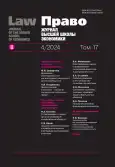Legal Approaches to Assessing Efficiency of Judiciary
- Authors: Ulyanov A.1
-
Affiliations:
- South Ural State National Research University
- Issue: Vol 17, No 4 (2024)
- Pages: 235-253
- Section: Russian Law: Condition, Perspectives, Commentaries
- URL: https://journal-vniispk.ru/2072-8166/article/view/317732
- DOI: https://doi.org/10.17323/2072-8166.2024.4.235.253
- ID: 317732
Cite item
Full Text
Abstract
The article deals with issues related to the evaluation of the effectiveness of the judiciary and the administration of justice in the Russian Federation. The purpose of the study is to update approaches and identify criteria for evaluating the effectiveness of the judiciary, classify them by levels of organization of the judicial system and types of legal proceedings, search for key tasks and directions to improve the effectiveness of the administration of justice in the Russian Federation. It is noted that the judiciary occupies a special place in the constitutional system of public institutions. Despite this circumstance, the judiciary as part of the unified system of public authority in Russia and justice as a special type of state activity cannot be outside the evaluation system, which, first of all, is dictated by the public demand for legitimate, socially oriented, accessible and open justice. On the basis of system-structural, formal-legal, formal-logical and other methods of cognition, it is proposed to use various approaches to assessing the effectiveness of such categories as: “judicial authority”, “judicial activity”, “justice”. The author comes to the conclusion that from the point of view of the constitutional and legal doctrine, the evaluation of the effectiveness of the judiciary is not equivalent to the evaluation of the effectiveness of justice. The latter is considered as the degree of achievement of the tasks of implementing lawful, accessible, open one and socially oriented justice in all types of legal proceedings, for the purpose of state protection of human and civil rights and freedoms, the interests of society and the state. The effectiveness of justice in a narrow sense is expressed in statistical indicators of the work of judicial bodies. However, in a broad sense, the effectiveness of justice is associated with the overall contribution that the entire judicial system makes to achieve constitutional goals and national tasks. Special attention is paid to the effectiveness of constitutional justice as a key factor in the effective functioning of the judicial system. Recommendations are made aimed at improving the practice of executing decisions of the Constitutional Court, increasing the effectiveness of electronic justice, information openness of the judiciary.
About the authors
A. Ulyanov
South Ural State National Research University
Email: 70ru@bk.ru
ORCID iD: 0000-0003-3858-2424
References
- Astafyev A.Yu. (2012) Efficiency of judicial activity: concepts and criteria of evaluation. Vestnik Voronezhskogo gosudarstvennogo universiteta=Bulletin of Voronezh State University, no. 1, p. 130 (in Russ.)
- Berdnikova E.V. (2012) Forms of public control in judicial system of the Russian Federation. Izvestiia Saratovskogo universiteta=Bulletin of Saratov University, no. 1, pp. 97–101 (in Russ.)
- Bryantseva O.V. (2019) Electronic justice in Russia. Vestnik Universiteta Kutafina=Bulletin of Kutafin University, no. 12, pp. 97–104 (in Russ.).
- Kleandrov M.I. (2015) On imperfection of judge qualification machine. Rossiiskoe pravosudie=Russian Justice, no. 6, pp. 5–12 (in Russ.).
- Kolesnikov E.V., Saibulaeva S.A. (2017) Fulfilling the Constitutional Court decisions. Rossiiskaia justitcia=Russian Justice, no. 1, pp. 55–58 (in Russ.)
- Kurochkin S.A. (2020) Criteria and indicators of efficiency of civil proceedings. Pravo. Zhurnal Vysshey shkoly ekonomiki=Law. Journal of the Higher School of Economics, vol. 13, no. 4, pp. 137–138 (in Russ.)
- Lebedev V.M. (2001) Judicial authority in modern Russia. Saint Petersburg: Lan’ Press, p. 174 (in Russ.)
- Mityukov M.A. (2001) Fulfilling the Russian Constitutional Court and regional constitutional (statutory) courts decisions. Rossiyskaia justitcia=The Russian Justice, no. 6, pp. 12–14 (in Russ.)
- Mikhailov V.K. (2022) Openness and transparency of the court as a guarantee of the independence of justice. Zhurnal rossiiskogo prava=Journal of Russian Law, vol. 26, no. 2, pp. 138–151 (in Russ.).
- Momotov V.V. (2018) Judicial reform of 2018 in the Russian Federation: concept, goals, content. Zhurnal rossiiskogo prava=Journal of Russian Law, no. 10, pp. 145– 146 (in Russ.)
- Morshakova T.G. (1977) Criteria for the efficiency of organization and activity of the judicial system. In: Organization of judicial activity. Moscow: Juridicheskaya literatura, p. 62 (in Russ.)
- Nechaeva Zh. V. (2007) Efficiency of executing decisions of the Constitutional Court of the Russian Federation. Filosofiia obrazovaniia= Philosophy of Education, no. 2, pp. 187–194 (in Russ.)
- Noskov I. Yu. (2013) Judicial activity and justice: concept, correlation. Sovremennoe pravo=Modern Law, no. 11, pp. 84–90 (in Russ.)
- Petrukhin I.L. (1979) Theoretical foundations of the justice efficiency. Moscow: Nauka, p. 244 (in Russ.)
- Tishchenko A.V. (2018) Electronic justice: judicial reform by 2020. Pravoporiadok: istoriia, teoriia, praktika=Law and Order: history, theory, practice, no. 4, pp. 65– 69 (in Russ.)
Supplementary files








